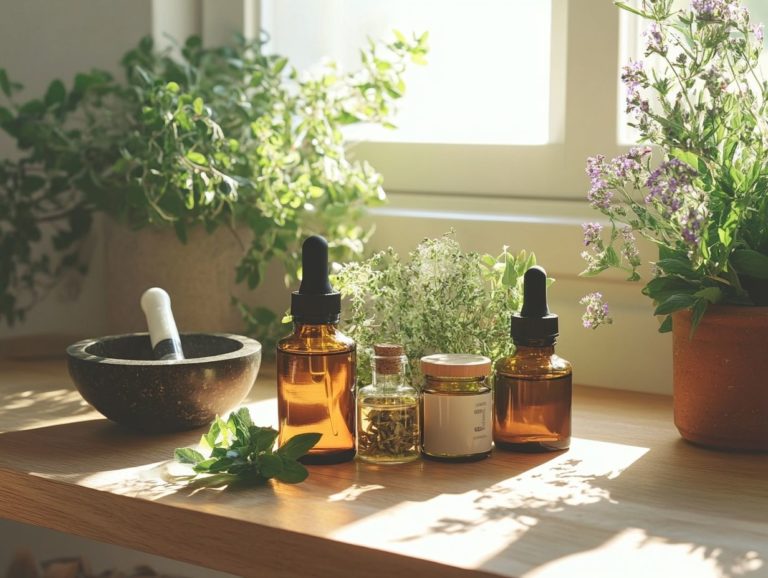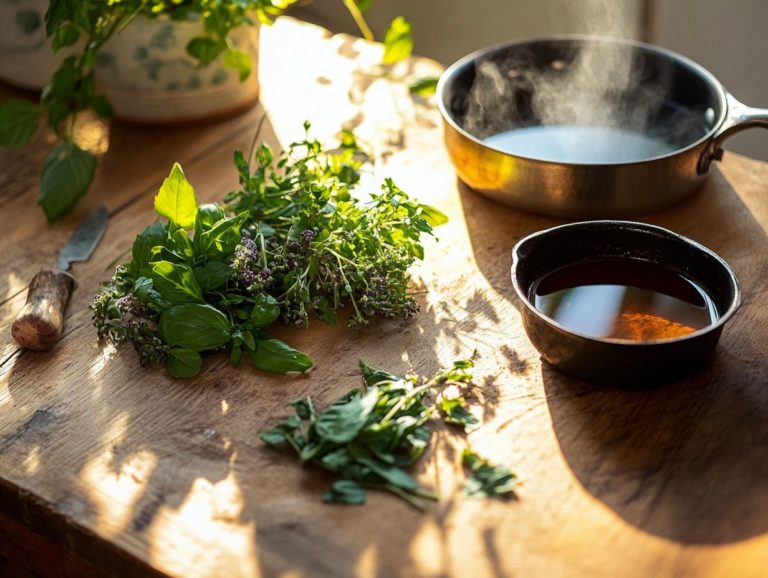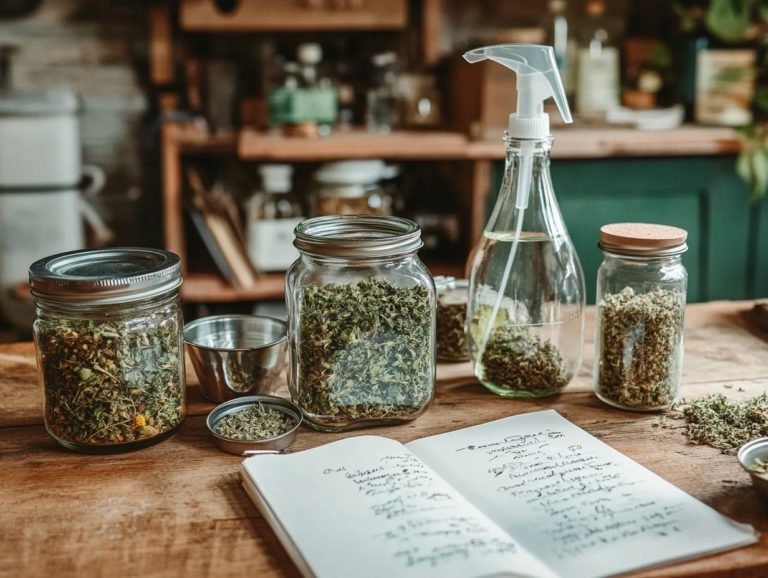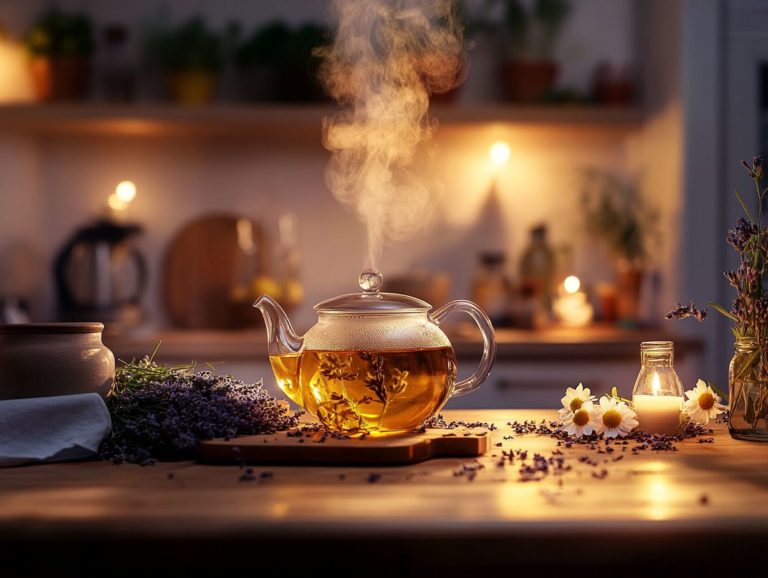Herbal Preparations: Extracting the Essence
Herbal preparations have been revered for centuries, presenting a natural path to wellness and healing by drawing from the essence of various aromatic plants.
This article delves into various extraction methods, such as water-based, alcohol-based, and oil-based techniques. These processes capture the essence of plants, ensuring high extraction yields at low cost. It also investigates the therapeutic benefits these preparations can offer while addressing essential safety considerations and potential side effects linked to different herbal extracts.
You’ll discover a practical, step-by-step guide for creating your own herbal preparations at home. Utilize methods like tinctures and infusions to extract active ingredients effectively. Start your herbal journey today!
Contents
- Key Takeaways:
- Common Methods of Extraction
- Benefits of Herbal Preparations
- Safety Considerations
- How to Make Herbal Preparations at Home
- Frequently Asked Questions
- What are herbal preparations?
- What is meant by ‘extracting the essence’ in herbal preparations?
- What are the different methods of extracting the essence in herbal preparations?
- What are the benefits of using herbal preparations over conventional medicines?
- Are there any safety precautions to consider when using herbal preparations?
- Is it possible to make herbal preparations at home?
Key Takeaways:
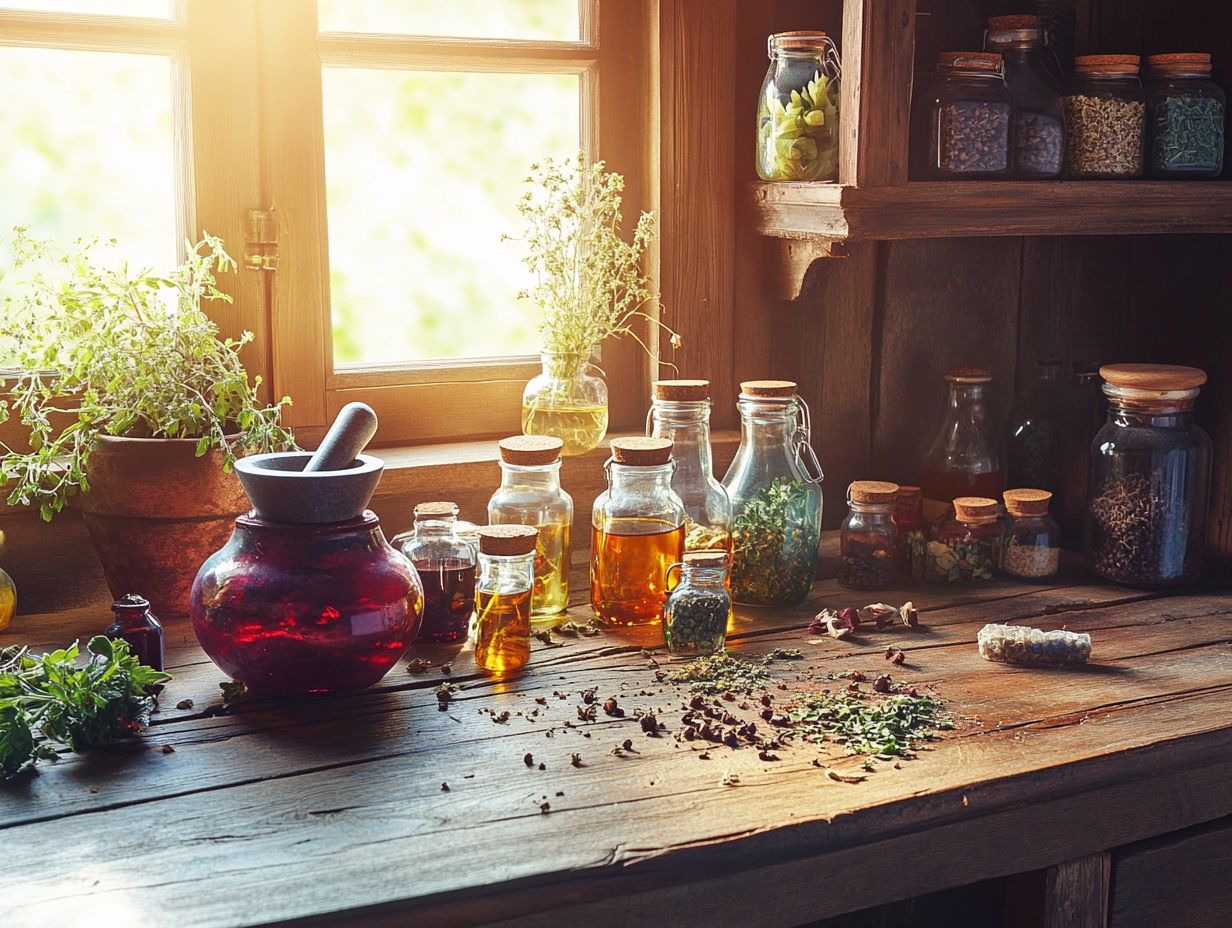
- Herbal preparations are extracts from plants with medicinal benefits.
- Common extraction methods include water, alcohol, and oil.
- Safety should always be considered when making herbal preparations.
What are Herbal Preparations?
Herbal preparations are intricate blends sourced from a variety of aromatic plants, including medicinal herbs and botanical extracts. They are prized for their therapeutic properties. These preparations typically involve the extraction of active ingredients through methods like steam distillation and solvent extraction. They play a vital role in both traditional and modern medicine, offering a compelling natural alternative to synthetic pharmaceuticals.
The importance of these herbal remedies is highlighted by their ability to address a wide range of health issues, from digestive troubles to stress relief. Utilizing techniques such as maceration and percolation, herbalists can optimize the extraction of essential compounds. To learn more about these methods, refer to how to brew perfect herbal infusions. They always consider the pharmacological effects that ingredients, like tonka beans and various herbal spices, may offer.
More people are discovering the benefits of holistic health. You’re not alone in turning to these natural solutions as effective options for enhancing your overall well-being, one herbal preparation at a time.
Common Methods of Extraction
Common methods of extraction are essential in crafting herbal preparations. They ensure that you achieve high extraction yields at a low cost.
By employing advanced technologies like steam distillation, ethanol, and acetone, you can effectively derive essential oils and other valuable components from biomass.
Water-Based Extraction
Water-based extraction is a cornerstone technique for obtaining herbal extracts. It utilizes water as a solvent to create hydrosols and other aqueous solutions that embody the essence of aromatic plants.
This method captures the therapeutic and flavorful qualities inherent in various types of biomass, making it critical in the herbal preparation industry. By employing hot or cold water, you can extract vital plant compounds, essential oils, and other beneficial substances without resorting to harmful chemicals. For those interested in safety, it’s important to consider creating herbal remedies: safety tips.
This process preserves the plant’s aromatic profile and amplifies its medicinal properties. It allows you to craft soothing tonics and natural remedies that resonate with natural health practices.
As a result, this technique has gained traction among herbalists and formulators who are committed to producing high-quality, natural products while honoring the integrity of nature.
Alcohol-Based Extraction
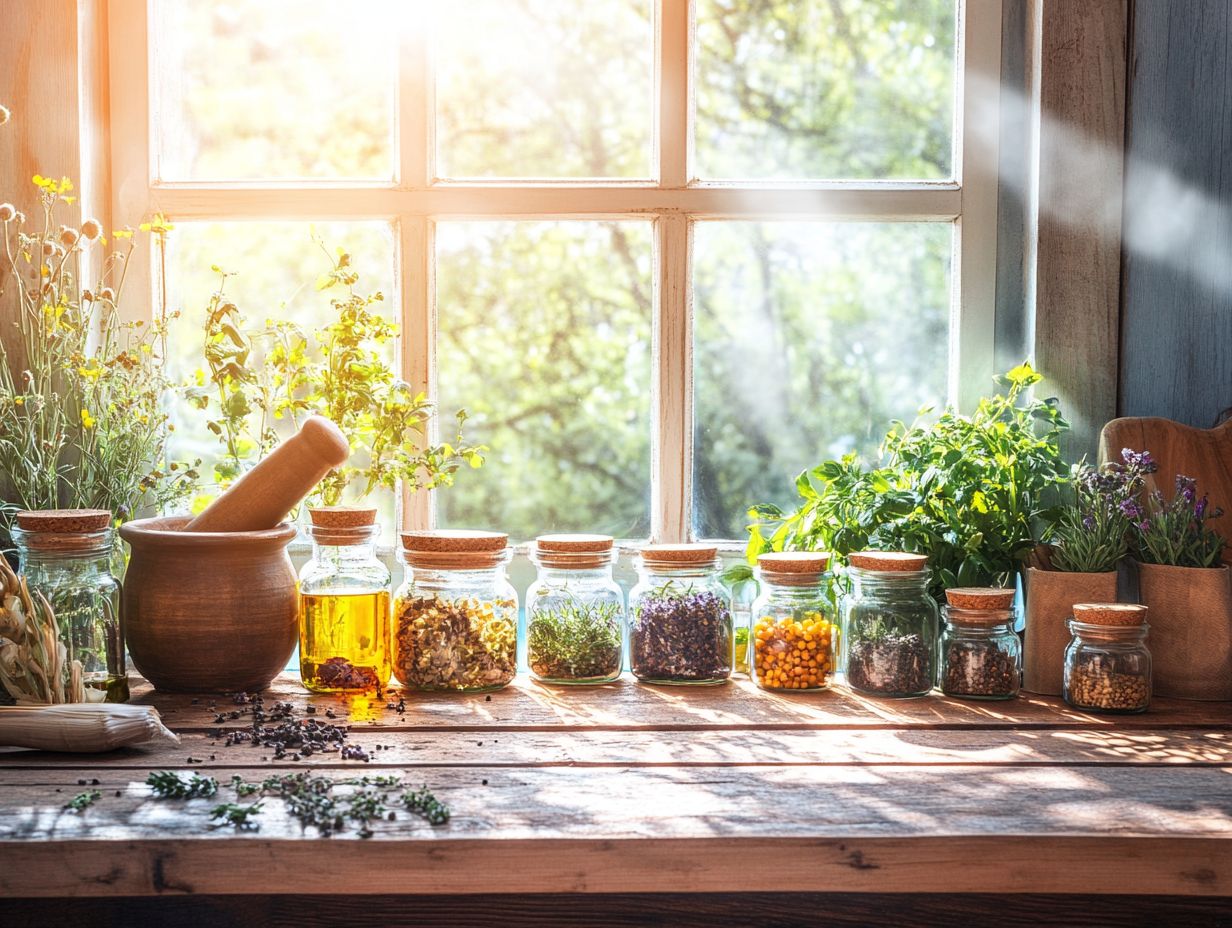
Alcohol-based extraction, particularly with ethanol, is a favored technique for producing tinctures and various medicinal extracts. This method is fantastic for keeping the essential oils fresh and potent!
What sets this technique apart is its impressive ability to break down complex plant structures. This allows for the release of a wide array of beneficial compounds, including flavonoids, terpenes, and alkaloids.
As a result, the tinctures you extract not only become more potent but also boast a longer shelf life compared to other extraction methods.
Herbalists and wellness enthusiasts often turn to this method for crafting herbal remedies. The versatility of alcohol enhances the extraction of both water-soluble and fat-soluble components. Whether you’re creating soothing herbal tinctures or powerful extracts to tackle various health concerns, this extraction method proves invaluable in your pursuit of natural wellness solutions.
Oil-Based Extraction
Oil-based extraction methods, like cold pressing and solvent extraction, are frequently used to derive essential oils from a variety of herbs. These methods utilize hydrocarbons to capture the aromatic compounds and essence of the plants.
Among these techniques, cold pressing is particularly noteworthy for maintaining the natural integrity of the oils. This results in a vibrant flavor and aroma that resonates with the plants’ aromatic profile. This method mechanically squeezes the plant material to release the oils, making it an attractive option for those who prefer natural processes.
On the other hand, solvent extraction utilizes hydrocarbon solvents to produce larger quantities of oil and capture more delicate compounds. However, this approach often raises concerns about residual solvents and their potential health implications.
Ultimately, each method has its own set of advantages and drawbacks. Your choice will depend on the desired quality and purity of the essential oils.
Benefits of Herbal Preparations
Herbal preparations present an array of benefits, encompassing both therapeutic and medicinal applications that leverage the health benefits of natural compounds. These preparations are particularly esteemed for their anti-inflammatory and antimicrobial properties, making them invaluable assets in holistic health practices.
Therapeutic and Medicinal Uses
The therapeutic and medicinal uses of herbal preparations are extensive. Numerous medicinal herbs showcase powerful pharmacological effects and antioxidant properties that can significantly enhance your overall health.
Take curcumin, for example the active compound in turmeric. It has garnered considerable attention for its anti-inflammatory properties, positioning it as a valuable ally for those grappling with arthritis or chronic pain.
Then there s ginkgo biloba, whose flavonoids are believed to improve cognitive function and enhance circulation. This could potentially provide relief for individuals facing memory loss or vascular issues.
Ashwagandha is known for its adaptogenic powers that help manage stress and anxiety, ultimately supporting your mental well-being.
Don t miss out on how these powerful herbs can transform your health!
Safety Considerations
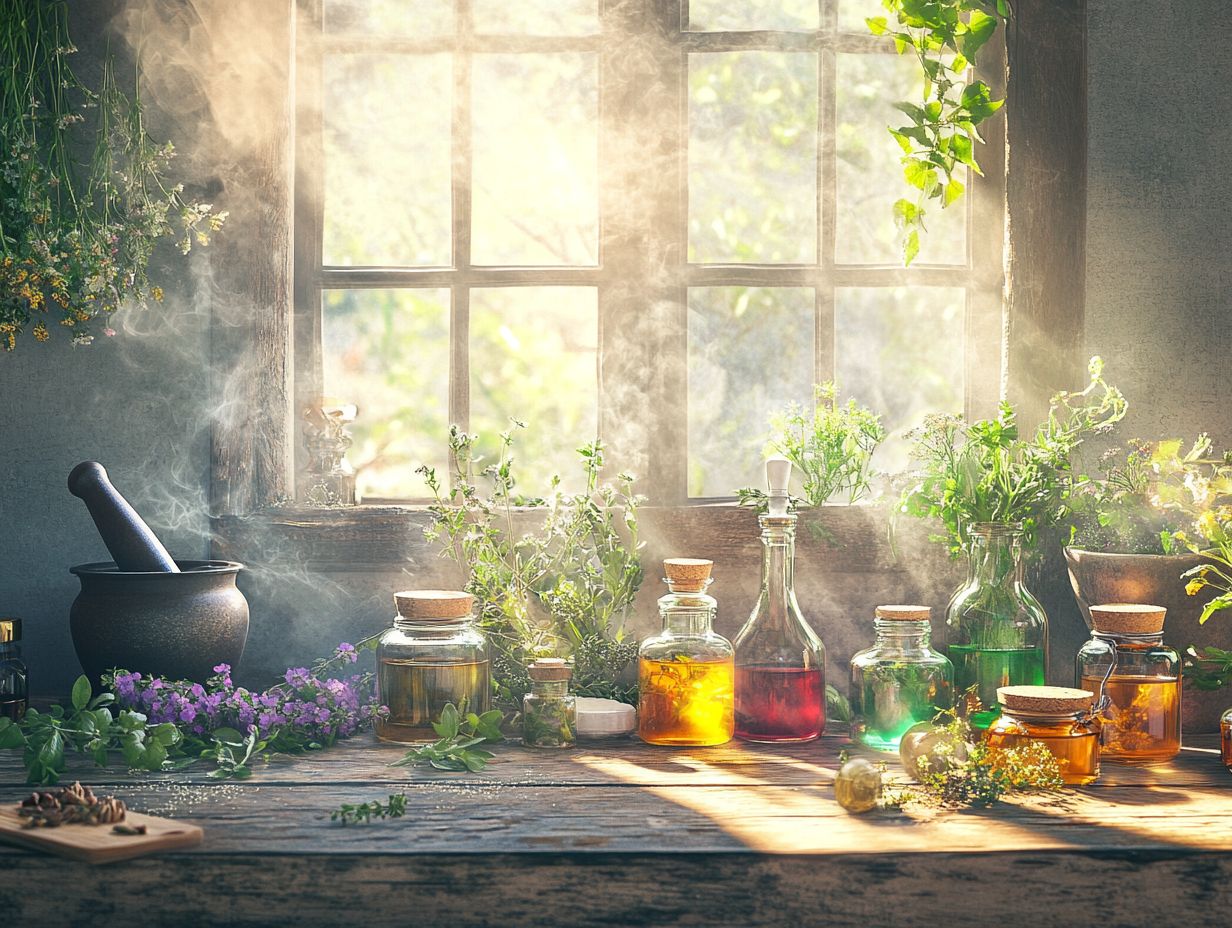
When exploring herbal preparations, it s essential to prioritize safety. There are potential risks and side effects linked to the consumption of certain herbs and extracts, especially when used improperly or in excessive amounts.
Potential Risks and Side Effects
Understanding the potential risks and side effects associated with herbal extracts is crucial for safe usage, as some medicinal herbs can lead to adverse reactions or negatively interact with pharmaceuticals.
Take St. John’s Wort for example. While it s commonly used for depression, it can significantly reduce the effectiveness of medications like birth control pills and certain antidepressants, which could lead to unintended consequences. Then there’s ginseng, often taken to boost energy, but it might leave you grappling with insomnia, headaches, or gastrointestinal issues.
Some herbal preparations, such as kava, come with a warning label of their own specifically, the risk of liver damage, especially when taken in large quantities or for extended periods. To navigate these potential pitfalls, consult healthcare professionals before embarking on any herbal regimen. This way, you can avoid unforeseen complications and ensure your overall well-being.
How to Make Herbal Preparations at Home
Making herbal preparations at home is exciting and fulfilling! You have the opportunity to harness the power of nature, using various extraction methods like tinctures and infusions to craft your unique herbal essences.
Step-by-Step Guide
A step-by-step guide for crafting herbal preparations is essential for achieving the desired results. Begin by selecting the right herbs, determining the most suitable extraction method, and meticulously following the process to create tinctures, hydrosols, or other forms of extracts.
In this intricate journey, start by researching various herbs to grasp their medicinal properties and confirm they align with your intended effects. Once you’ve carefully chosen your herbs, the next pivotal decision is selecting an appropriate extraction method, be it cold infusion, hot infusion, or alcohol extraction. For beginners, exploring 5 essential herbal preparations can provide valuable insights. Each method demands specific timings and ratios, which are crucial for preserving the natural compounds.
After preparing the herbs through precise slicing or grinding, embark on the extraction process, where exact measurements and a controlled environment are paramount. Once the extraction is complete, filtration becomes essential to separate the solid herb material from the liquid extract, resulting in a concentrated product rich in active ingredients, primed for packaging and use. For more insights, check out herbal infusions: methods and benefits.
Frequently Asked Questions
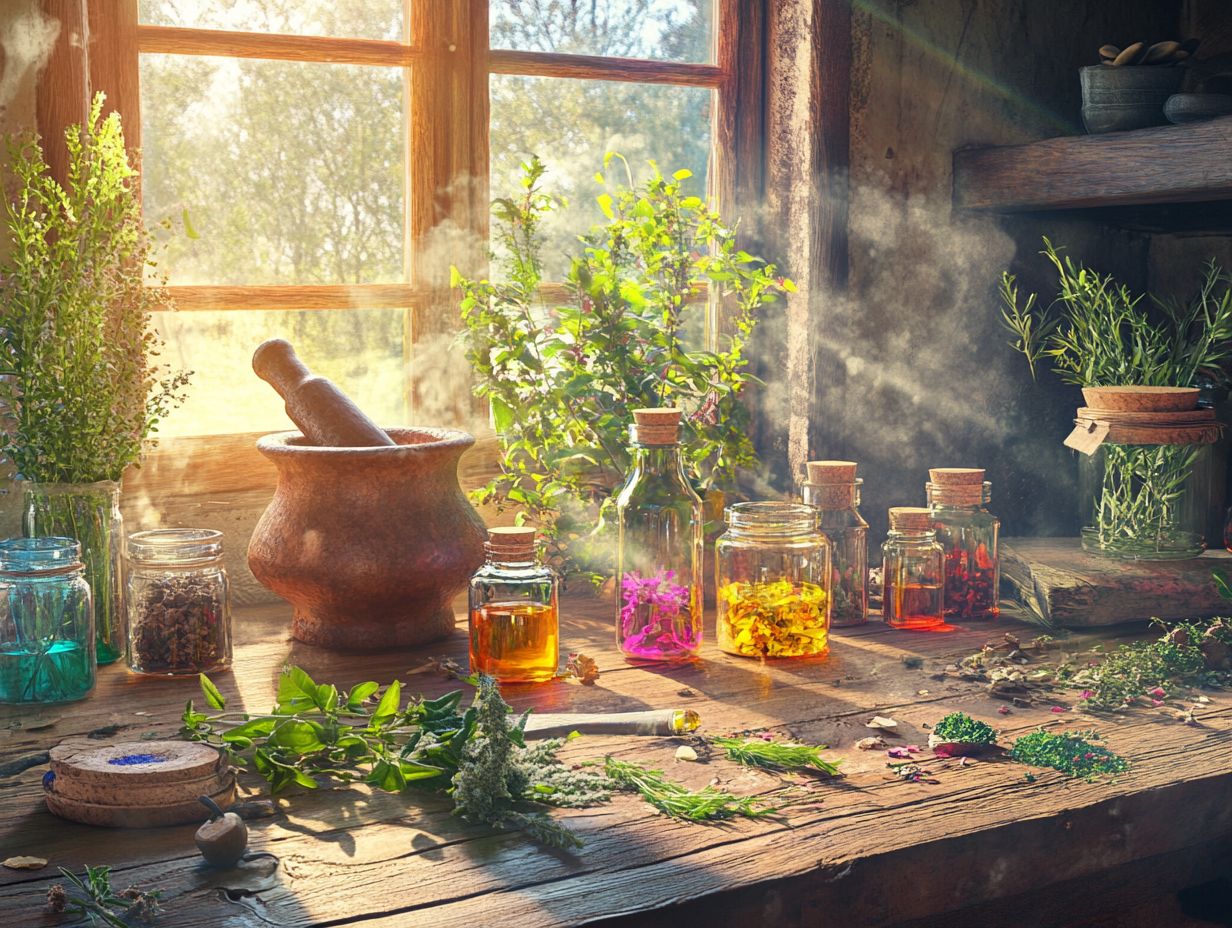
-
What are herbal preparations?
Herbal preparations are medicines and remedies made from plant-based ingredients, such as leaves, flowers, roots, and bark.
-
What is meant by ‘extracting the essence’ in herbal preparations?
Extracting the essence refers to the process of isolating and concentrating the active compounds from plants, which are believed to have medicinal properties.
-
What are the different methods of extracting the essence in herbal preparations?
Some common methods include infusion, decoction, maceration, cold pressing, and steam distillation. Each method is used to extract different types of compounds from the plants.
-
What are the benefits of using herbal preparations over conventional medicines?
Herbal preparations can provide a more natural and holistic approach to healing, with potentially fewer side effects. They also often contain a wide range of beneficial compounds, rather than just one isolated chemical.
-
Are there any safety precautions to consider when using herbal preparations?
Yes, it is important to consult with a qualified herbalist or healthcare professional before using herbal preparations, especially if you have any preexisting medical conditions or are taking other medications. Some herbs may also interact with certain medications.
-
Is it possible to make herbal preparations at home?
Yes, many herbal preparations can be made at home using simple ingredients and tools. However, it is important to research and follow proper instructions to ensure safety and effectiveness.
Start your herbal adventure today just remember to consult your healthcare provider first!
In conclusion, exploring herbal preparations can open a world of natural healing options. By understanding the benefits and practicing safe methods, you can enhance your well-being with the wonders of nature.

